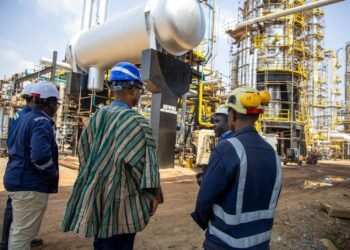Italian energy giant Eni has successfully reached financial close with the UK Government’s Department of Energy Security and Net Zero (DESNZ) for the Liverpool Bay CCS project, marking a pivotal step in advancing the country’s commitment to carbon capture and storage (CCS) solutions.
Ed Miliband, the UK Secretary of State for Energy Security and Net Zero, expressed optimism about the partnership. Eni, as the operator of the CO2 transport and storage system for the HyNet industrial cluster, is now poised to enter the construction phase of this landmark initiative.
“This investment from our partnership with Eni is government working together with industry to kickstart growth and back engineers, welders, and electricians through our mission to become a clean energy superpower.
“We are making the UK energy secure so we can protect families and businesses and drive jobs through our Plan for Change.”
Ed Miliband, the UK Secretary of State for Energy Security and Net Zero

The financial close enables significant investments in supply chain contracts, with a large proportion allocated to local businesses and communities.
During the construction phase, the project is expected to generate approximately 2,000 jobs, creating new production chains and safeguarding existing industrial employment.
This milestone underscores the long-term industrial competitiveness of the UK, offering transformative opportunities for growth and sustainability.
The project forms part of the UK Government’s broader commitment to carbon capture, utilization, and storage (CCUS), backed by a £21.7 billion investment over 25 years across the first two CCS clusters, of which HyNet is a leading component.
Eni’s Liverpool Bay CCS

Under the project, CO₂ captured from industrial emitters will be transported through a 149-kilometre network of onshore and offshore pipelines, including 35 kilometres of newly built infrastructure.
These pipelines will direct CO₂ to Eni’s depleted natural gas reservoirs beneath Liverpool Bay, which will be repurposed as secure geological storage.
“The strategic agreement with the UK Government paves the way for the industrial-scale development of CCS.
“The United Kingdom reaffirms its leadership thanks to the promotion of a regulatory framework that aims to strengthen the development of CCS and make it fully competitive in the market.”
Eni CEO Claudio Descalzi
Descalzi highlighted Eni’s leadership role within the HyNet Consortium, positioning the cluster as one of the world’s first large-scale low-carbon industrial zones.
He added that the project demonstrates how CCS can become a vital pillar of energy transition efforts, not just in the UK but globally.
The Liverpool Bay CCS project is a central component of the HyNet industrial cluster, which aims to decarbonize major industries such as manufacturing, refining, and power generation.

By providing a viable pathway to capture and permanently store CO₂, the initiative is set to significantly reduce the carbon footprint of sectors that are difficult to decarbonize through electrification or renewables alone.
The project also features the innovative reuse of existing offshore platforms, a move that reduces costs, speeds up implementation, and exemplifies sustainable engineering practices.
Eni underscored CCS as a core element of its corporate decarbonization strategy. Globally, the company is developing a range of CCS initiatives with a combined gross storage capacity of approximately 3 billion tonnes of CO₂.
These projects align with Eni’s long-term climate goals and its ambition to support net-zero pathways across its operational footprint.
The Liverpool Bay CCS project serves as a blueprint for effective public-private cooperation in accelerating the energy transition.
With a solid regulatory foundation, government funding, and private sector expertise, the project illustrates how carbon capture infrastructure can be scaled up quickly and responsibly.
As the UK eyes a leadership role in the global clean energy sector, projects like Liverpool Bay CCS are likely to become increasingly central to national industrial and environmental strategies.
The next phase of the HyNet Cluster’s development will be closely watched as a litmus test for the viability of CCS as a large-scale climate solution.
READ ALSO: Wencai Zhang Calls on Finance Minister, Pledges Stronger World Bank-Ghana Partnership























